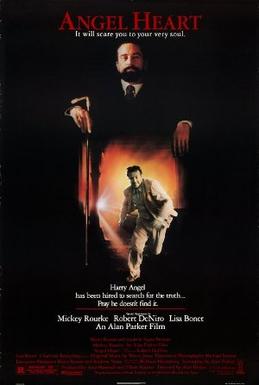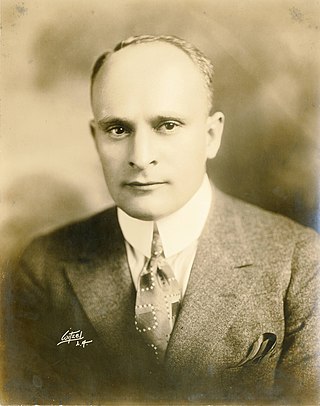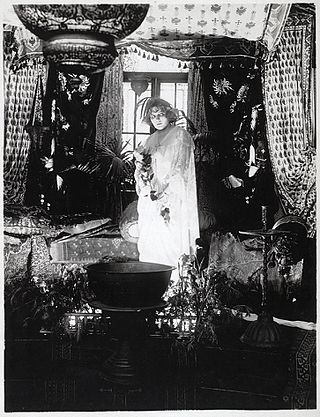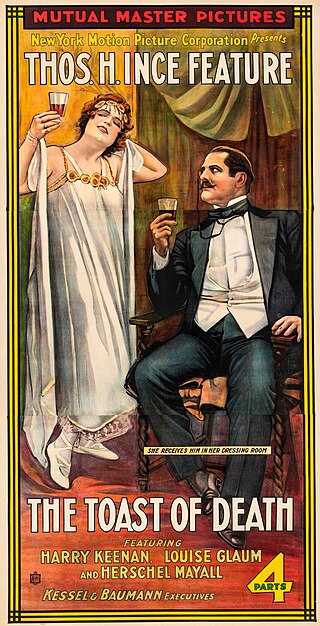
William Harrison Hays Sr. was an American politician, and member of the Republican Party. As chairman of the Republican National Committee from 1918 to 1921, Hays managed the successful 1920 presidential campaign of Warren G. Harding. Harding then appointed Hays to his cabinet as his first Postmaster General. He resigned from the cabinet in 1922 to become the first chairman of the Motion Picture Producers and Distributors of America. As chairman, Hays oversaw the promulgation of the Motion Picture Production Code, which spelled out a set of moral guidelines for the self-censorship of content in American cinema.

Angel Heart is a 1987 American neo-noir psychological horror film, an adaptation of William Hjortsberg's 1978 novel Falling Angel. The film was written and directed by Alan Parker, and stars Mickey Rourke, Robert De Niro, Lisa Bonet, and Charlotte Rampling. Harry Angel (Rourke), a New York City private investigator, is hired to solve the disappearance of a man known as Johnny Favorite. His investigation takes him to New Orleans, where he becomes embroiled in a series of brutal murders.

Irene Ryan was an American actress and comedian who found success in vaudeville, radio, film, television, and Broadway. She is most widely known for her portrayal of Daisy May "Granny" Moses, mother-in-law of Buddy Ebsen's character Jed Clampett on the long-running TV series The Beverly Hillbillies (1962–1971). She was nominated for Emmy Awards for Outstanding Lead Actress in a Comedy Series in 1963 and 1964 for the role.

Louise Glaum was an American actress. Known for her roles as a vamp in silent era motion picture dramas, she was credited in her early career with giving one of the best characterizations in such parts.

Enid Eulalie Bennett was an Australian silent film actress, mostly active in American film.

Charles Gardner Sullivan was an American screenwriter and film producer. He was a prolific writer with more than 350 films among his credits. In 1924, the magazine Story World selected him on a list of the ten individuals who had contributed the most to the advancement of the motion picture industry from its inception forward. Four of Sullivan's films, The Italian (1915), Civilization (1916), Hell's Hinges (1916), and All Quiet on the Western Front (1930), have been listed in the National Film Registry.

Enter Madame is an American romantic comedy film directed by Elliott Nugent, starring Elissa Landi and Cary Grant, and released by Paramount Pictures.

The Wolf Woman is a 1916 silent era drama motion picture starring Louise Glaum, Howard C. Hickman, and Charles Ray.

Sahara is a 1919 American dramatic film written by C. Gardner Sullivan and directed by Arthur Rosson. The film starred Louise Glaum and told a story of love and betrayal in the Egyptian desert.

Slander House is a 1938 American drama film directed by Charles Lamont. The film's producer was Ben Judell of Progressive Pictures, known for low-budget exploitation films with provocative titles; other films released by Progressive the same year included Rebellious Daughters and Delinquent Parents.

The Toast of Death is a 1915 silent era drama/romance motion picture released by Mutual Film Corporation starring Louise Glaum, Harry Keenan, and Herschel Mayall.

The Lone Wolf's Daughter is a surviving 1919 American silent era crime/drama/thriller motion picture starring Bertram Grassby, Louise Glaum, and Thomas Holding.

The Leopard Woman is a 1920 American silent adventure romance drama film starring Louise Glaum, House Peters, and Noble Johnson. Directed by Wesley Ruggles and produced by J. Parker Read, Jr., the screenplay was adapted by H. Tipton Steck and Stanley C. Morse based on the novel The Leopard Woman (1916) by Stewart Edward White.

Fifty-Fifty is a 1925 American silent drama film starring Hope Hampton, Lionel Barrymore, and Louise Glaum. Directed and produced by Henri Diamant-Berger for the production company Encore Pictures, Fifty-Fifty is a remake of a 1916 Norma Talmadge film also titled Fifty-fifty that was directed by Allan Dwan, who wrote the original story.

Love is an extant American 1920 silent era romance drama film starring Louise Glaum, James Kirkwood, and Joseph Kilgour. Directed by Wesley Ruggles and produced by J. Parker Read, Jr., the screenplay was adapted by Louis Joseph Vance based on a story by Carol Kapleau.

Golden Rule Kate is a 1917 American silent Western film starring Louise Glaum, William Conklin, Jack Richardson, Mildred Harris, and John Gilbert. It was directed by Reginald Barker from a story written by Monte M. Katterjohn and produced and distributed by the Triangle Film Corporation.

Pre-Code sex films refers to movies made in the Pre-Code Hollywood era, roughly encompassed between either the introduction of sound in the late 1920s or February 1930 and December 1934. This period was marked by an increase of sensationalistic content in pictures made by the major studios in a climate marked by the Great Depression and major debates on morality, often containing sexual references and images that were contrary to the yet to be enforced Hays Code. Pre-Code sex films explored women's issues and challenged the concept of marriage, and aggressive sexuality was the norm. The sexual subject matter of the uncensored period was found within many movie genres, most especially in dramas, crime films, exotic-adventure films, comedies and musicals.

Death Game is a 1977 American psychological thriller film directed by Peter S. Traynor, and starring Sondra Locke, Seymour Cassel, and Colleen Camp. The film follows an affluent San Francisco businessman who finds himself at the mercy of two violent, deranged women with a fetish for violence, whom he unwittingly allows into his home during a rainstorm.

The Branding Iron is a 1920 American silent drama film directed by Reginald Barker and starring Barbara Castleton and James Kirkwood. It was produced by Barker and Samuel Goldwyn and distributed by Goldwyn Pictures. Castleton appeared nude in the film, which caused the particular scene to be cut in some parts of the country. Pennsylvania banned the film altogether due to the topic of infidelity.

Love Madness is a 1920 American silent crime film directed by Joseph Henabery and starring Louise Glaum, Matt Moore, and Noah Beery.
























